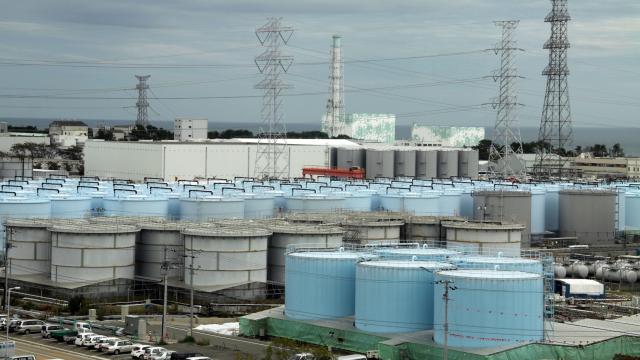A remark by Japanese environment minister Yoshiaki Harada about dumping wastewater from the damaged Fukushima nuclear power plant directly into the Pacific Ocean has sparked outrage among Japanese fishermen and environmental groups.
Harada made the comments early Wednesday during a press briefing in Tokyo, reports the Japan Times.
Responding to a question, Harada said Tokyo Electric Power Company Holdings Inc. (TEPCO) will soon have no other option but to drain the radioactive water “into the ocean to dilute it.” This was his “simple opinion,” said Harada, adding that the Japanese government will make a decision on the matter once it has reviewed a pending report from an expert panel commissioned by the government, according to the Japan Times.
That radioactive water is steadily accumulating at the damaged Fukushima No. 1 nuclear power plant is a legitimate concern. Ever since the earthquake and ensuing tsunami ravaged the plant in 2011, TEPCO has been storing the contaminated water in hundreds of giant tanks at the site.
Over the years, some 1 million tons of radioactive water, which is pumped through cooling pipes to prevent the core from melting, has been collected at the facility, reports the Guardian.
The amount of water is approaching critical levels in terms of space, prompting Harada’s remarks. TEPCO said it will run out of space by 2022, according to the Japan Times, but the minster offered no specifics in terms of how much water should be dumped into the ocean. TEPCO officials have yet to comment on the ministers remarks.
TEPCO has managed to remove most of the radioactive isotopes from the wastewater using an “advanced filtration process,” reports the BBC, but it doesn’t have the technology to remove the hydrogen isotope tritium. It’s not uncommon for nuclear plants to dump tritium-laced water into the ocean.
The Guardian described tritium as “mostly harmless,” and the BBC said the radionuclide “would pose a low risk,” but government documents leaked to The Telegraph in 2018 suggested contaminants like radioactive strontium, iodine, rhodium and cobalt remain in the water “above legally permitted levels.” Indeed, some risks may exist, as The Telegraph reports:
Environmental groups caution that radionuclides can build up in fish and shellfish, for example, and strontium in the bones of small fish that might be consumed by humans would potentially be a serious concern. If ingested by humans, strontium 90 concentrates in teeth and bones and can cause bone cancer or leukaemia.
Opposition to the minister’s remarks came quickly.
Tetsu Nozaki, head of the Fukushima Prefectural Federation of Fisheries Cooperative Associations, described Harada’s comments as “thoughtless, in light of his position” as environment minister, adding that “calm discussions” are needed on the matter, reports the Japan Times.
A representative from an official fishery cooperative said, if the water is dumped into the ocean, “safety measures we have taken and our sales promotion efforts would be shattered instantly, and our businesses will be destroyed,” per the Japan Times.
Japan could also annoy its neighbours, namely South Korea, which is worried that contaminated water could negatively impact its own seafood industry. To that end, South Korea summoned a senior embassy official this past August to discuss Japan’s plan for the tainted water.
In an email sent to Reuters, a senior Greenpeace nuclear expert said the Japanese government “must commit to the only environmentally acceptable option for managing this water crisis which is long term storage and processing to remove radioactivity, including tritium.”
Indeed, other options may exist, according to the Telegraph, including “burying it in concrete pits well below the surface or injecting it into deep geological strata,” in addition to the ideas offered by the Greenpeace official.
It’s definitely a situation with few good outcomes. Fukushima continues to be the nuclear disaster that keeps on giving, and TEPCO doesn’t expect to complete its decommissioning of the plant until the 2050s.
With the wastewater steady accumulating at the site, something’s gotta give. We’ll learn more about the fate of the contaminated water once the Japanese government reviews the report from its expert panel.
